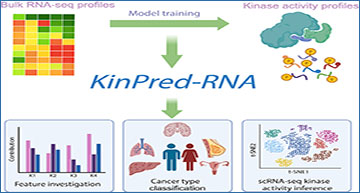Kinases play a pivotal role in regulating various cellular processes by transferring phosphate groups from high-energy molecules to specific substrates. These enzymatic reactions are crucial for cell signaling, metabolism, and gene expression, making kinases attractive targets for understanding and treating diseases, including cancer.
Challenges in Kinase Activity Analysis
Traditionally, assessing kinase activity has been a laborious and expensive process, often requiring specialized techniques and valuable samples. Additionally, while existing algorithms can analyze kinase activity from phosphorylated proteomics data, methods for extracting this information from bulk RNA sequencing data have remained elusive.
Introducing KinPred-RNA
In a groundbreaking study, researchers at the Chinese University of Hong Kong have introduced a novel computational framework called KinPred-RNA, designed to derive kinase activities from bulk RNA-sequencing data obtained from cancer samples. This innovative approach harnesses the power of machine learning, specifically the eXtreme Gradient Boosting (XGBoost) regression model, to predict kinase activities accurately.
Outperforming Traditional Methods
To validate the efficacy of KinPred-RNA, researchers compared its performance with other regression models, including Random Forest, multiple linear regression, and Support Vector Machine (SVM). Impressively, KinPred-RNA surpassed these models in predicting kinase activities from cancer-related RNA sequencing data, demonstrating its superior accuracy and efficiency.
Utilizing Gene Signatures
One key aspect of KinPred-RNA is its utilization of efficient gene signatures extracted from the LINCS-L1000 dataset as inputs. These gene signatures provide valuable information about the molecular profiles of cancer cells, enabling KinPred-RNA to make highly accurate predictions related to kinase activity and biological function.
Significance for Cancer Research
The development of KinPred-RNA represents a significant advancement in cancer research, offering a non-invasive and cost-effective method for assessing kinase activities in cancer samples. By uncovering the hidden role of kinases in cancer biology, KinPred-RNA has the potential to revolutionize our understanding of the disease and facilitate the identification of novel therapeutic targets.
In conclusion, KinPred-RNA stands as a beacon of hope in the field of cancer research, offering a promising avenue for unraveling the complexities of kinase signaling in cancer. By harnessing the power of computational biology, this innovative framework has the potential to accelerate the discovery of new treatment strategies and ultimately improve outcomes for cancer patients worldwide.
Availability – All original code has been deposited at https://github.com/tibettiger/kinase_prediction and is publicly available.
Zhang Y, Yao L, Chung CR, Huang Y, Li S, Zhang W, Pang Y, Lee TY. (2024) KinPred-RNA – Kinase Activity Inference and Cancer Type Classification using Machine Learning on RNA-seq Data. iScience [Epub ahead of print]. [article]





